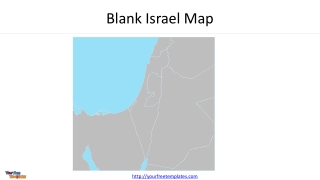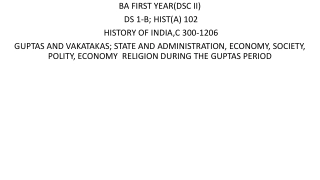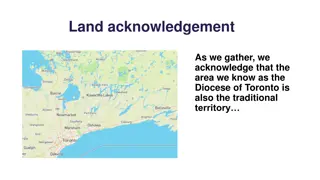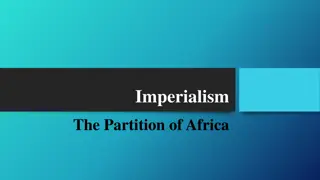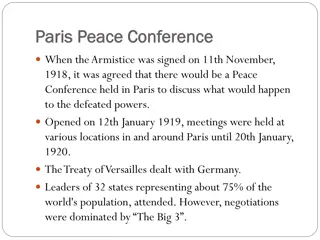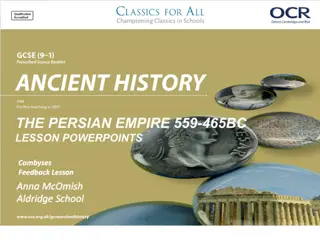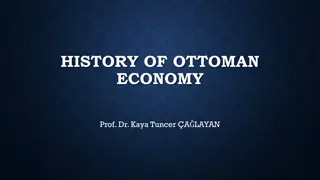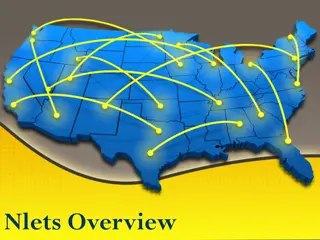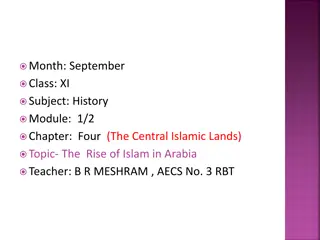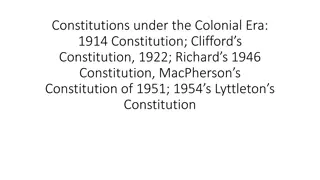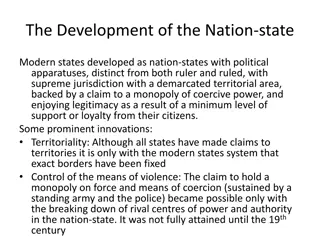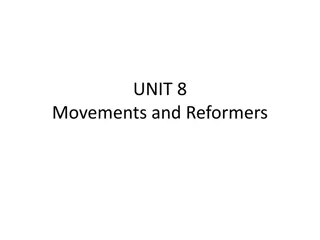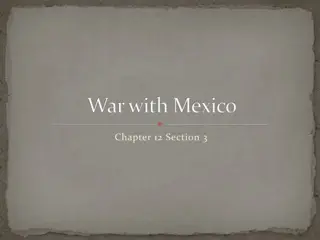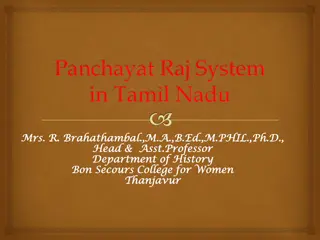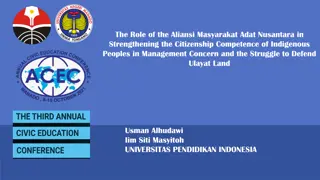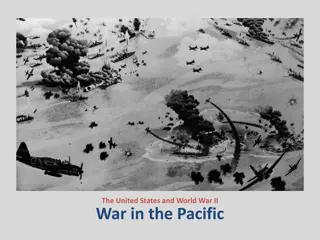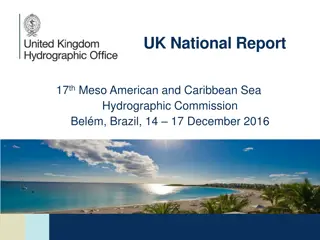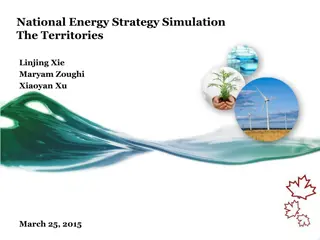Blank Israel Map
Explore a detailed map of Israel and Palestine, highlighting countries, territories, capitals, and major cities. The map includes Lebanon, Syria, Egypt, Jordan, Iraq, Saudi Arabia, Mediterranean Sea, Red Sea, and more.
0 views • 4 slides
Emergence and Expansion of Powers Before the Guptas
Explore the political landscape of ancient India before the rise of the Guptas, including minor powers and rulers like Kushanas, Nagas, Vakatakas, Ikshvakus, and more. Learn about the varied kingdoms and emerging territories shaping the region's history.
6 views • 25 slides
Grade 10-11 Course Planning and Graduation Requirements Overview
Explore the essential aspects of grade 10-11 course planning, graduation requirements, and assessments for high school students. Learn about the importance of fulfilling both graduation and university admission requirements, including the specifics of the Dogwood Diploma requirements, credit distrib
6 views • 37 slides
Navigating Cultural Shifts: Co-Design in Organizational Contexts
In a time of societal transformation, there is a growing demand for transparency and collaborative decision-making processes. This project, led by a diverse team of collaborators, focuses on co-design methodologies within organizational settings to empower stakeholders and foster meaningful engageme
1 views • 29 slides
Exploring Germanic Tribes and Languages in History
Delve into the ancient Germanic tribes and languages, their territories, movements during the Migration Period, surviving languages, writing systems, and encounters with prominent historical figures like Roman generals. Learn about the earliest mentions of Germans by Greek travelers and astronomers,
3 views • 35 slides
Roman Republic Expansion and Punic Wars Overview
Learn about the Roman Republic's expansion from 350 B.C.E. to 150 B.C.E., including their policies towards conquered territories, trade networks, and conflicts with Carthage in the Punic Wars. Explore key aspects of Roman society, politics, economics, and culture during this period through bellringe
1 views • 32 slides
Roman Republic Expansion and Conquest of Carthage
The Roman Republic expanded its territories by securing Italy first, showing tolerance towards conquered peoples, and forming alliances with Carthage. They treated conquered people differently based on their proximity and established a vast empire beyond Italy, significantly influencing regions like
4 views • 31 slides
Registration and Program Guide for BComm Students
Presented by Undergraduate Student Services at Haskayne School of Business, this guide offers a comprehensive overview for BComm students including recommended course sequences, academic requirements, registration tools, important considerations, and student support resources. The agenda covers topi
1 views • 30 slides
Early Explorers in Western Virginia
Exploration of Western Virginia by early adventurers, including Abraham Wood and John Lederer, sheds light on the conflicts between French and English settlers. Discover the challenges and triumphs of these pioneers as they navigated unknown territories and interacted with indigenous peoples, leavin
3 views • 15 slides
Overview of AANAPISI Program in the United States
The Asian American and Native American Pacific Islander Serving Institutions (AANAPISI) Program aims to support institutions with a minimum of 10% Asian American and Native American Pacific Islander undergraduate enrollment. Currently, there are 54 funded AANAPISI institutions across 16 states and t
0 views • 13 slides
Discover the Highest Quality Coffee Beans in Gilbert | Coffee Rush
Coffee Rush in Gilbert is the place to visit for anyone looking to find the best high quality coffee beans in Gilbert. Using a strict criteria of choosing only the best beans which can be found in specific territories with unique flavors, Coffee Rush guarantees that each served cup of coffee is a wo
0 views • 3 slides
Acknowledgement of Indigenous Territories in the Diocese of Toronto
The Diocese of Toronto acknowledges the traditional territories of the Anishnaabe, Haudenosaunee, and Wendat peoples, along with the Dish with One Spoon Wampum Belt Covenant. They express gratitude for Indigenous stewardship of the land, recognize historical injustices, and commit to fostering an ho
0 views • 8 slides
European Imperialism and the Division of Africa in the 19th Century
European countries like Britain, France, and Germany began claiming African territories in the late 1800s, impacting indigenous populations and leading to various resistance movements. The Berlin Conference resulted in superimposed boundaries, affecting trade and resources. Islamic influences expand
0 views • 19 slides
Understanding Positionality and Indigenous Data Sovereignty in Critical Data Work
Explore the impact of positionality on data work, challenge notions of value-free research, and address issues of erasure and harm in Indigenous data sovereignty. Reflect on how personal values and experiences influence data understanding, and consider the rights of Indigenous peoples in owning and
5 views • 8 slides
Negotiations at the Paris Peace Conference: The Treaty of Versailles
The Paris Peace Conference of 1919 marked a significant event where the Treaty of Versailles was negotiated by the Big Three - Woodrow Wilson, Georges Clemenceau, and David Lloyd George. This treaty addressed key areas such as assigning guilt for the war, reducing armies, determining reparations, la
1 views • 19 slides
Land Acknowledgement at York University
York University respects the enduring relationships Indigenous Nations hold with the territories on which its campuses stand. These connections predate the university’s establishment, and York University recognizes the historical significance and presence of Indigenous communities.
1 views • 86 slides
Comparing Cambyses and Cyrus: Foreign Policy Perspectives
Explore the contrasting foreign policy approaches of Cambyses and Cyrus, focusing on their views towards foreign peoples, religion, and leadership. Analyze historical evidence to uncover the differences in their treatment of conquered territories and cultures. Evaluate the reliability issues surroun
0 views • 6 slides
Overview of the Ottoman Empire's Economy and Social Structure
The history of the Ottoman Empire's economy and social structure encompasses its Turkish and Islamic influences, as well as its geographical diversity across regions like Asiatic, East European, and African territories. The empire's centuries-long existence from 1300 to 1918 saw distinct periods of
3 views • 105 slides
Nlets - Connecting Law Enforcement Across States
Nlets, established in the mid-60s, is a vital interstate communications system linking law enforcement agencies across 50 states, D.C., territories, and federal agencies for secure data exchange. It is crucial for law enforcement, justice, and public safety missions. Nlets differs from NCIC and is g
0 views • 21 slides
The Rise of Islam in Arabia: Understanding Islamic Empires and Culture
Explore the origins and development of the Islamic community in the Arabian Peninsula, spanning from 600 to 1200 AD. Learn about the rise of Islamic empires in Afro-Asian territories, the impact of the Crusades, and the evolution of faith, politics, and society. Delve into key concepts such as the C
0 views • 22 slides
Impact of Colonialism on Nigerian Politics
Colonialism played a significant role in shaping Nigeria as a state, with colonialists merging independent communities to form the nation. The political systems introduced by colonial powers were exploitative, focused on maximizing returns for the colonizers rather than serving the needs of the Afri
0 views • 53 slides
Evolution of the Nation-State and Modern State Concepts
The development of the nation-state marks a significant shift in political organization, characterized by centralized power, territoriality, and legitimacy gained through citizen support. Key innovations include territorial demarcation, monopolization of coercion, impersonal power structures, and th
0 views • 8 slides
Development of Indian Penal Code (IPC) 1860 and Its Impact in British India
The Indian Penal Code (IPC) of 1860 was introduced in British India after a series of historical events led to the need for a comprehensive criminal justice system. The disintegration of the Mughal Empire paved the way for British takeover, resulting in variations in criminal laws across different B
1 views • 24 slides
Crisis Counseling Assistance and Training Program (CCP) Overview
The Crisis Counseling Assistance and Training Program (CCP) offers short-term disaster relief grants to states, U.S. territories, and federally recognized tribes. CCP grants support community-based outreach by training local individuals to provide services such as crisis counseling and emotional dis
0 views • 26 slides
Khilafat Movement in India: A Historical Perspective
The Khilafat Movement was a significant event in Indian political history, triggered by the British not fulfilling promises made to protect Turkey during World War I. The movement aimed to safeguard Turkey's holy places, restore its territories, and revive the Ottoman Empire. Despite efforts, includ
0 views • 30 slides
The First Carnatic War: A Historical Overview
Fought between English and French forces in the Carnatic region of Southern India from 1746 to 1748, the First Carnatic War was a significant conflict in colonial history. Led by key figures like Governor-General Dupleix and Major Stringer Lawrence, the war resulted in an inconclusive outcome with t
0 views • 6 slides
Manifest Destiny: The Annexation of New Mexico and California
The expansion of the United States into the territories of New Mexico and California, driven by the ideology of Manifest Destiny, involved a complex interplay of historical events including the Santa Fe Trail, Spanish missions in California, conflicts with Mexican settlers, and President Polk's stra
0 views • 11 slides
Evolution of Panchayati Raj System in India
The Panchayati Raj system in India aims at rural development and self-government at the grassroots level. This system has been implemented in all states except Nagaland, Meghalaya, and Mizoram, and in certain Union Territories. Various committees such as the Balwant Rai Mehta Committee have played a
0 views • 20 slides
Human Evolution: Out of Africa Hypothesis
The Out of Africa Hypothesis suggests that humans originated in Africa and then migrated to other parts of the world in two waves. The first migration occurred around 100,000 years ago, following the Nile River into the Middle East. The second migration, approximately 85,000 years ago, saw a group o
0 views • 59 slides
Preparing for Natural Disasters: Earthquakes, Extreme Heat, and Floods
Natural disasters like earthquakes, extreme heat, and floods pose significant risks across the United States, impacting various states and territories. Understanding the characteristics and potential dangers of each disaster type is crucial for effective preparedness. This guide highlights essential
0 views • 30 slides
Strengthening Indigenous Peoples' Citizenship Competence Through Aliansi Masyarakat Adat Nusantara
In the context of defending Ulayat land, the role of Aliansi Masyarakat Adat Nusantara (AMAN) is crucial in empowering Indonesian indigenous peoples with citizenship competence. This research explores the efforts of AMAN in enhancing indigenous community awareness, understanding, and education to st
6 views • 8 slides
World War II in the Pacific: Unfolding of Events Post Pearl Harbor Attack
The war in the Pacific escalated post the Pearl Harbor attack with Japan's domination over various territories, including the Philippines leading to significant battles like the Japanese Invasion of the Philippines and Doolittle's Raid. American strategy, led by figures like Gen. MacArthur, played a
0 views • 12 slides
Discovering the Arctic: A Wintery Wonderland
The Arctic, located in the northernmost part of our planet, is a captivating region comprising the Arctic Ocean and territories of various countries. Home to unique wildlife like polar bears, snowy owls, and Narwhals, the Arctic also houses indigenous communities such as the Inuits. Learn about iglo
2 views • 7 slides
Italian Military Policy and National Challenges: A Historical Analysis
The history of Italian military policy from 1860 to 1960 reveals a complex relationship between the army, state, and society. The military's role in defending new territories and maintaining internal order, along with its performance in battles such as Lissa and Custoza, reflects a transitional peri
0 views • 20 slides
European Islands VAT and Taxation Policy Overview
European islands have unique VAT and taxation policies. Various islands in Europe have different approaches to VAT, including special rates and exemptions. For example, in Greece, certain islands have lower VAT rates compared to the mainland. Countries like Germany and Spain exclude specific territo
0 views • 8 slides
Central Europe in the Age of Absolutism: Habsburgs and Hohenzollerns
Habsburg Austria lost and acquired territories, Maria Theresa inherited lands with the Pragmatic Sanction, leading to a diverse Hapsburg Empire. The rise of the Hohenzollerns in Brandenburg-Prussia saw Frederick William and Frederick the Great consolidating power through military and administrative
3 views • 13 slides
Understanding Chromosome Territories in the Nucleus
Chromosome territories refer to specific regions in the nucleus where chromosomes are organized. While chromosomes appear as condensed structures during cell division, they have a different appearance in non-dividing cells like neurons. Scientists have used microscopy to study chromosome organizatio
0 views • 17 slides
UKHO Activities and Support in Meso-American and Caribbean Seas
UK Hydrographic Office (UKHO) published its National Report and detailed its activities in chart production, ENC production, paper chart production, publications, support to coastal states, and survey activities in the Meso-American and Caribbean Seas region. The report highlights UKHO's role as the
0 views • 10 slides
Breast Cancer Screening Programs and Guidelines in Canada
Organized breast cancer screening programs are available in most provinces and territories in Canada for asymptomatic women at average risk. The screening guidelines recommend mammograms every two years for women aged 50 to 74 or 75, with variations in age acceptance and recruitment methods across r
0 views • 48 slides
National Energy Strategy Simulation: Addressing Energy Challenges in the Territories
This comprehensive report assesses the weaknesses and missed opportunities in energy policy in the territories, focusing on issues such as expensive heating costs, insufficient energy supply, and aggressive promotion of oil and gas development. It also delves into the challenges and opportunities re
0 views • 9 slides
